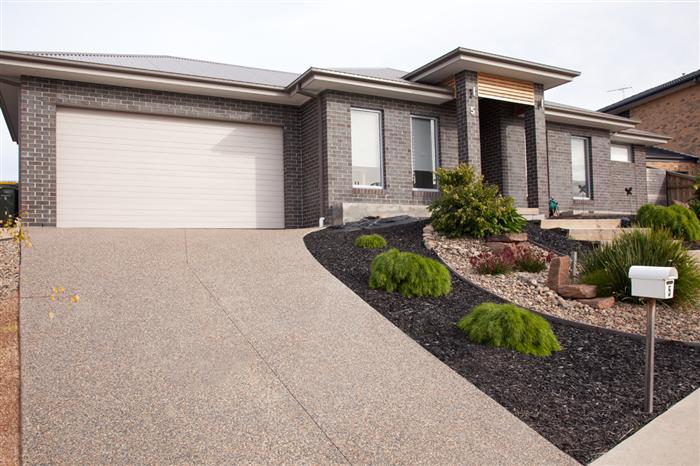Quite surprisingly, driveways are often treated as an afterthought in many home renovations. However, driveways are more than just a utility – it is the first thing a person notices when they arrive at your home and completes the whole look and feel of your property.
As such, it is important to take time and choose the right driveway layout, materials, and colour scheme to optimise your curb appeal. In addition, the type of driveway you choose will also affect the cost, durability, and maintenance of your driveway.
To help you make an informed decision about the best driveway for your home, we have put together a simple guide on some of the most common types of driveways in Australia and why they are a good choice.
Exposed aggregate
Exposed aggregate driveways are one of the most favoured types of driveways among Australians. It is a combination of aggregates such as stones, shale, or even pebbles, which are then added to the concrete.
There are many ways this aesthetically pleasing effect is obtained, one of which is by removing a thin layer from the top of laid concrete to reveal the embedded materials near the surface. This shows the natural textures and colours of the aggregates with a smooth and fixed gravelly surface.
Benefits:
- Durable and skid resistant.
- Requires minimal maintenance – you only need to have it resealed every few years.
- It has a variety of colours, textures, finishes, and aggregate mixes for you to choose from.
- Maintains integrity on sloped and uneven surfaces.
Concrete
Concrete driveways are the old standby for driveways, and this is because of two reasons: it is typically the longest-lasting driveway’s surface, and if installed correctly, it is practically maintenance-free. Concrete is also an extremely versatile material that can help you achieve a variety of looks to suit the style of your home.
You can also add colour to your concrete to have a wide range of coloured concrete options. When you hire the right concreter in Melbourne to install your coloured concrete driveway, the pigment of your concrete will not fade regardless of the harsh Australian weather, surface abrasion, or even UV rays.
Benefits:
- It is strong, durable, long-lasting, and low maintenance.
- You can pick a good-quality coloured concrete driveway to match the look and feel of your home.
- Many different patterns can be created from stamped concrete so that you have a one-of-a-kind driveway.
- Concrete is one of the more affordable paving materials in the market.
Textured concrete
Textured concrete driveways became popular in the late 80s and 90s and almost immediately took the decorative paving world by storm. There are two types of textured concrete driveways that you can commonly see in many Australian homes: stencilled concrete and slate concrete finish.
Stencils are an effective way to create textured, non-slip driveway surfaces with a unique grout finish that helps increase the market value of your home – why spend a fortune when you can replicate natural stone or brickwork for a fraction of the cost, and that too with extreme durability?
Meanwhile, slate concrete finishes provide a luxurious look to your driveway as it replicates the impression of the traditional two-toned authentic stone texture, making the concrete driveway look more realistic. Also known as “stamped concrete”, this type of driveway is created by stamping mixed concrete with a textured mate to duplicate slate patterns.
Benefits:
- It is versatile as it comes in many colours, patterns, and textures and can mimic a wide range of surfaces, including marble and stone.
- Adds value to your home, providing it with a more luxurious finish.
- Durable and suitable for constant traffic or homes with children due to its anti-slip characteristics.
- Easy to install.
What to consider when choosing a driveway
Maintenance and durability
When choosing a driveway, you should look into the maintenance and durability of its material. Each type of driveway material has its own maintenance requirements, and some materials are more durable than others. You should weigh the pros and cons and decide based on the long-term maintenance costs.
Installation, safety, engineering, and the building codes
A driveway not only needs a solid foundation, but it also has to comply with the National Construction Code 2019, which regulates the construction of concrete structures on properties – this includes the installation of pathways and driveways. You should seek advice from an engineer, experienced concreter, or relevant government bodies before undertaking any work on a driveway to ensure it meets all necessary regulations.
Cost
As mentioned, you should factor in the varying long-term costs associated with different types of driveways. Do not be tempted to invest in a cheap driveway material due to its low up-front installation costs without looking into its future maintenance and repair costs and how frequently you may be required to do these.
Engage the driveway specialists
Still unsure which driveway to choose for your home? Then, let our Simply Driveways specialists help you. With over 21 years of experience in the driveway construction industry, we can offer you expert advice on driveways, their materials, designs, and maintenance and suggest the best type based on your home, budget, and lifestyle. Get in touch with us today!


Recent Comments